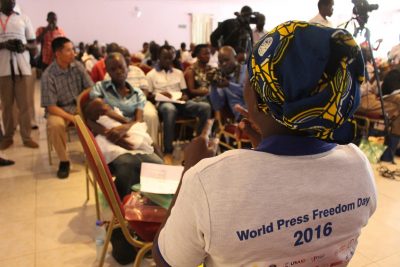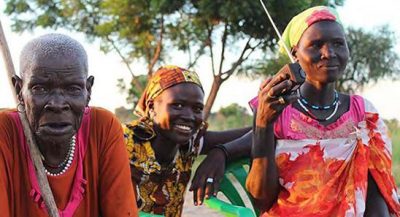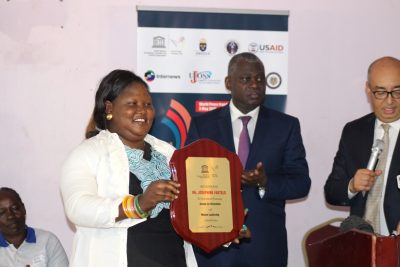By
Peter Louis
The newly established South Sudan Information Commission has been urged to ensure that people living with disabilities such as the deaf, blind and with other physical challenges have equal access to information as guaranteed in the South Sudan Right of Access to Information Act, 2013.
This call was made by participants from the South Sudan deaf community, during the recent commemoration of the 2016 World Press Freedom Day held in Juba.
Organised by media stakeholders with support from UNESCO, the Government of Sweden, Internews, USAID and the American Embassy in Juba, the event was preceded by two weeks long advocacy for fundamental media freedoms and brought together over 200 media stakeholders from the media, government, civil society and development partners, under the theme “Access to Information and Fundamental Freedoms, This Is Your Right!”
This call on equal access to information by all citizens was also echoed by UNESCO and the journalists attending the World Press Freedom Day event. They urged the newly appointed South Sudan Information Commission to fast track the implementation of the Right of Access to Information law and guarantee that every citizen has the right to freedom of information, including the right to access information and records held by public or private bodies, or in the possession of any level of government in South Sudan organ or agency. They also urged the government to provide the media with access to information that is meant for public consumption and create a better enabling environment for press freedom, which is prerequisite for not only a vibrant media sector but also for a society to contribute to the development of the country.
Decrying the declining press freedom index rating and lack of investigation in cases against journalists, the UNESCO Country Representative Salah Khaled said that the rating from evaluations of press freedom, safety of journalists and the issue of impunity on cases against journalists have unfortunately been on a down trend, especially since the conflict broke out in December 2013 and are of great concern to UNESCO and the international community. He also called on the new Government of National Unity to work on improving the media environment as a priority, as well as work the media as an important partner in stabilising and building the country on all fronts.
Speaking during this event, the United Nations Deputy Special Representative of the Secretary General Mr Eugene Owusu, stressed the need for press freedom in South Sudan. “It is my absolute conviction that press freedom will be one of the drivers that will help transition this country from conflict to prosperity and a vibrant media will make South Sudan more dynamic”. He also spoke against journalists being forced to be silent and emphasised that the media is the fourth estate and journalists should speak and speak immediately, while the echoes of the pain of South Sudanese, the signs of despondency and the claims of triumph are still in the air.
South Sudan is one of the 5 Countries that have been implementing the UN Plan of Action on Safety of Journalists and the Issue of Impunity, which aims at coordinating all the stakeholders’ efforts, with a view to ensuring that journalists carry out their job in a safe environment. To acknowledge and appreciate the lead role that the media and human rights defenders have taken in advocating for press freedom and safety of journalists in South Sudan, UNESCO as the United Nations lead agency in advocating for freedom of expression and safety of journalists recognised two media personnel and one human rights defender from South Sudan, during the 2016 World Press Freedom Day commemorations.
Mr. Alfred Taban, the editor in chief of Juba monitor and the co- chair of the South Sudan Media Sector Working Group, was recognised for courageously and consistently advocating for press freedom and media development in South Sudan. Mr. Edmund Yakani, the executive director of CEPO and the co-chair of the South Sudan Media Sector Thematic Working Group on safety of journalist and the issue of impunity, was also recognised for his consistency in defending the right to freedom of expression and Safety of Journalists in South Sudan. Lastly, UNESCO also recognised Ms. Josephine Achiro Fartelo, director of Radio Bakhita and the secretary general of the Community Media Network of South Sudan, for her dedication in promoting access to information and as leader and role model for the female journalists in South Sudan.
World Press Freedom Day was proclaimed by the UN General Assembly in 1993 following a recommendation adopted at the twenty-sixth session of UNESCO’s General Conference in 1991. It serves as an occasion to inform citizens of violations of press freedom, a reminder to governments of the need to respect their commitment to press freedom and a reflection among media professionals about issues of press freedom and professional ethics. The day also serves to celebrate the fundamental principles of press freedom, evaluate press freedom around the world, defend the media from attacks on their independence and to pay tribute to journalists who have lost their lives in the exercise of their profession.





No Comments Yet!
You can be first to comment this post!